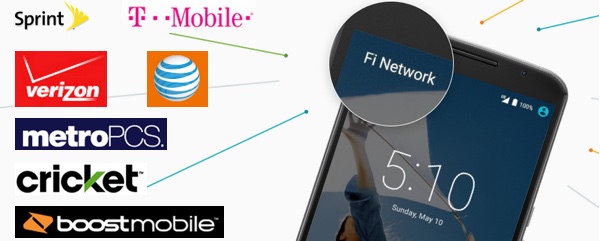Google Project Fi vs Other Carriers: What’s the Best Deal?
Should you switch to Google's Project Fi cellphone service? Before you decide, here's how the new carrier stacks up.
Google is shaking things up with Project Fi, its wireless service for smartphones that could put a scare into both major and discount carriers. With a tantalizingly low cost (starting at $30 per month), the combined strength of two cellular networks as a backbone (Sprint and T-Mobile), international texting and the ability to enable calls and texts across devices, Project Fi offers plenty of incentives for customers to jump ship. Plus, Google will give you a credit for unused data, as opposed to just rolling it over to the next month like T-Mobile and AT&T.

As the new kid on the block, how does Google’s Project Fi stack up against existing carriers with similar offerings?
| Header Cell - Column 0 | Project Fi | AT&T | Sprint | T-Mobile | Verizon | Boost | Cricket | MetroPCS |
|---|---|---|---|---|---|---|---|---|
| Monthly Fee* | $40 (2GB) | $55 (2GB) | $50 (3GB) | $50 (2GB) | $65 (3GB) | $35 (2GB) | $40 (2.5GB) | $40* (3GB) |
| Monthly fee* if you use only 0.5GB | $25 after credit for unused data | $55 (leftover data rolls over) | $50 | $50** | $65 | $35 | $40 | $40 |
| Unlimited International Texts | Yes | Yes | No | Yes | No | No | No | No |
| Smartphone Selection | Google Nexus 6, 5X & 6P | Dozens, from flagships to budget options | Dozens, from flagships to budget options | Dozens, from flagships to budget options | Dozens, from flagships to budget options | Dozens, from flagships to budget options | Dozens, mostly mid-level options | 3, starting at $29 |
| Data Overage Costs | $10 / 1 GB (or $1 / 100MB | $15 /1GB | None | None (data drops to 3G speeds) | $15 / 500MB | None (data drops to 3G speeds) | None (data drops to 3G speeds) | None (data drops to 3G speeds) |
* Calculations based on plan with unlimited talk, text with 2-3GB of data;
** Leftover data stored in T-Mobile's Data Stash, which keeps unused data for up to a year
What is Project Fi?
Simply put, Project Fi is a wireless service provider from Google. So instead of seeing AT&T, Sprint, T-Mobile or Verizon's operator logos on your phone, you'll see the Fi Network. Google's service will ride on T-Mobile and Sprint networks, switching between the two depending on which signal is stronger. Project Fi also taps into more than 3 million Wi-Fi hotspots, and Google says that its integrated encryption will keep your data safe.
MORE: No Contract Phone FAQ
Project Fi also lets you send and receive texts and calls from your Google account on any device with Hangouts installed, such as your laptop or tablet, if you opt-in to this feature. You'll also get unlimited international texting to and from 120-plus countries as well as free international data roaming.
Sign up to get the BEST of Tom's Guide direct to your inbox.
Get instant access to breaking news, the hottest reviews, great deals and helpful tips.
The service was invite-only when it launched, but has since opened to the public. You can pick a new number or bring an existing one. Keep in mind that for now, only the Nexus 6,Nexus 5X and Nexus 6P are compatible with Project Fi, and you can buy the latter two through Google when signing up. Some LTE-enabled Nexus tablets are supported as well.
Google Fi vs AT&T and Verizon
Both AT&T and Verizon are more expensive up front, at $55 and $65 respectively. While AT&T does offer free international texting, Verizon doesn't, and data roaming comes at extra cost. Both major carriers also charge overages when you exceed your allotted bandwidth, whereas Project Fi just charges you a dollar for each 100 MB you've used.
AT&T and Verizon both offer plenty more smartphone options than Project Fi does, and each company has a larger 4G footprint than Sprint and T-Mobile, covering most of the United States. Verizon also came in first for speed in New York City, Chicago and San Francisco in our 4G tests in major cities, while AT&T placed third in San Francisco, NYC and Chicago, and second in Los Angeles. Since Project Fi picks the stronger network between Sprint and T-Mobile and leverages Wi-Fi when available, though, carrier speeds might not be that big of an issue.
MORE: Verizon Wins NYC 4G Showdown
Google Fi vs Sprint
On Sprint, you can pick an unlimited data plan for $75 a month or get a 2GB plan for $10 more than it would on Project Fi. While Sprint's unlimited plan is a compelling value, keep in mind that its plodding network may drive you up the wall. The carrier ranked last in three out of four of our 4G performance tests in major American cities, although its Spark-enhanced LTE service helped it secure second place in Chicago. But Spark only reaches about 100 markets right now.
Though Project Fi does harness Sprint's channels, it also uses T-Mobile, so you'll have the power of two networks. Sprint offers free international text and data roaming for qualified customers and caps overseas data at 2G speeds, whereas Project Fi's international data goes up to 3G.
Like T-Mobile, Sprint will pay your early termination fees if you're switching over, and offers 50 percent off your previous rate plan, so those who are locked into a contract and want unlimited data may want to consider Sprint.
Google Fi vs T-Mobile
T-Mobile's basic Simple Choice plan starts at $50 for unlimited talk and text with 2GB of data, which is $10 more than the same plan on Project Fi. But the Uncarrier packs a lot of goodies into its lines, such as unlimited free video (from about 40 partners) and music streaming, unlimited international texts and free data roaming.
While Project Fi also offers unlimited international texts and international data without roaming fees, data speeds will be capped at 3G rates outside the U.S. T-Mobile's option offers 4G speeds where available as well as free international W-Fi Calling on compatible phones.
MORE: T-Mobile Has Fastest 4G LTE in Los Angeles
T-Mobile also has plenty of phone options, which is another advantage over Fi, and it will pay your early termination fees if you switch over from another carrier. Google will not pay your switching fees. But over the long term, Project Fi can save you money.
Google Fi vs MetroPCS
Same price, more data -- MetroPCS offers 1GB more bandwidth than Project Fi at the same $40 price. But Google gives you money back for your unused data, meaning potential cost savings over time. And when you exceed your data allowance, you can pay for more 4G data instead of being dropped to 3G speeds on MetroPCS. But at least Metro doesn't have overages.
Only 4 phones are compatible with MetroPCS's low-tier package, however, and they're lower-power, entry-level options (LG K7, HTC Desire 626s, LG Leon LTE and Samsung Galaxy Grand Prime). Project Fi is only compatible with the Nexus 6, 5X and 6P right now, and you can buy the latter two from Fi either at full price or over 24 smaller monthly payments.
Google Fi vs Boost Mobile and Cricket Wireless
Prepaid carriers Boost Mobile and Cricket Wireless both offer more data than Project Fi does at the $30 - $35 level. Boost gives you 2GB for $30 a month (if you enroll in Auto Pre-Boost), Cricket offers 2.5GB for $35 (if you enroll in Auto Pay), and both plans come with unlimited talk and text. That's at least twice the 1GB you get on Project Fi for $30. You'll also find a wider selection of phones from both companies, with both even offering such flagships as the Galaxy S7.
But neither Boost nor Cricket offer unlimited international texting, and you have to enroll in both carriers' automatic bill payment service to qualify for these prices. After reaching your data limit, both Boost and Cricket drop your data transmissions to 2G speeds.
Bottom Line
If you want the flexibility of using your phone number on all your devices and you travel a lot, Project Fi could be the carrier for you. Its costs and data allowances are comparable to plenty of packages already available. However, if you’re fond of your existing phone, you may want to stick with your current carrier: Project Fi is available only on the Nexus 6, 5X and 6P for now.
Data sharks on a budget may be better served with Cricket Wireless's $35 plan with 2.5GB of high-speed bandwidth. Frequent travelers who want better data speeds abroad should consider T-Mobile But if you’re looking for a lower-cost alternative to AT&T and Verizon, Project Fi could be worth a look.
Cherlynn is Deputy Editor, Reviews at Engadget and also leads the site's Google reporting. She graduated with a Master’s in Journalism from Columbia University before joining Tom's Guide and its sister site LaptopMag as a staff writer, where she covered wearables, cameras, laptops, computers and smartphones, among many other subjects.
-
BrandrMeginhar Why would anyone in their right mind trust Google as their data provider, when they have proven they don't respect your privacy?Reply
That's just stupid. You are nothing but a "cash cow" to be milked. -
Kevin0101 I don't see how this will compete with Cricket, which is actually owned and run by AT&T, so this means they have much better coverage than sprint and T-Mobile combined. Plus, you can get 20 gigs of 4g LTE for $55 a month with the $5 auto pay discount you mention. I was finally able to ditch my Comcast internet with this, finding it is enough Data monthly for all my uses. I just use the phone as a hotspot when the kids need the internet. Anyways, good luck everyone this should keep downward pressure on prices, and upward pressure on data, until we all can get rid of that dumb expensive pipe coming into our homes.Reply -
will1220 How do you leave Republic Wireless out of this article when it's the exact same thing Google is proposing with Google Fi?Reply -
Puiucs ReplyWhy would anyone in their right mind trust Google as their data provider, when they have proven they don't respect your privacy?
so you will trust the other ISPs when they proved that not only they don't respect your privacy, they don't even respect you as customer or even as a human?
That's just stupid. You are nothing but a "cash cow" to be milked.
-
rpmrush I've already signed up for the invite. There are still some details I need to know. Will a Verizon Nexus 6 work? When I'm on my own WiFi are they still charging me data? When it switches to a public wifi hotspot..is data still counted then? I like hangouts and I like the ability to be connected on all my devices through my number. I'm gonna test drive it.Reply -
rgd1101 Reply15736353 said:I've already signed up for the invite. There are still some details I need to know. Will a Verizon Nexus 6 work? When I'm on my own WiFi are they still charging me data? When it switches to a public wifi hotspot..is data still counted then? I like hangouts and I like the ability to be connected on all my devices through my number. I'm gonna test drive it.
Lot of the question can be answer here
https://fi.google.com/about/faq/ -
gamersglory need to really compare to other MVNO's like Ting and Republic Wireless as there pricing is somewhat similar to FiReply -
CherlynnLow Gamersglory, will1220 etc, a comparison with Republic is a good idea, we may/will include it in a future updateReply
To me the biggest draw of Project Fi and having Google as a provider is the cross-device operability. I won't need to have my phone on me to text my friends who have my phone number. So in that way it beats Cricket..
As for privacy concerns... I threw all that out the window the day I signed up for Gmail, I think.... -__-" heh -
Gee Dee Dubs Sounds good - but can you also bring your own unlocked phone if you don't want to purchase a new one? I'm partial to my iPhone 4s - not ready to give it up - just want better service - how flexible are they in that regard?Reply

